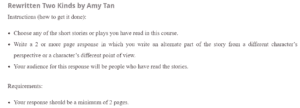Rewritten Two Kinds by Amy Tan
The short story Two Kinds written by Amy Tan brings about the theme of parental control. The author tries to explain that parents cannot have full control over their children, but should only offer support and advice. The story focuses on a Chinese family comprising a mother and her daughter, Ni Kan. The mother and the daughter have some differences in opinions: the mother is trying to force her daughter to follow her advice and guidelines strictly, but the daughter has a mind of her own. Initially, Ni Kan tried to follow her mother’s advice but later on, when she was a grown-up realized that she needed to make her own decisions and her mother should not dictate her life. As a result, the two end up having conflicting opinions and thus facilitating the theme of the story. Ni Kan wants to be independent, while her mother wants her to follow her ideals.
At the start of the story, Ni Kan’s mother is depicted to be trying to dictate what her future would be like. At the time, Ni Kan was only about nine years old. Therefore, at that stage of her life, it would seem like her mother was trying to influence her character and make her successful. Her mother believed that Ni Kan could do anything that she desired in the United States, where they were immigrants. All of Ni Kan mother’s hopes lied in America, where most people believe to be a place of opportunities. Therefore, she believed that Ni Kan would be one of the lucky people to get opportunities that would promote their lives. Consequently, Ni Kan was thrilled of the fact that she was going to be a successful Chinese in America. She would refer to herself as being the “Chinese Shirley Temple” (Tan, 2017). Hence, Ni Kan and her mother shared the same opinions of being successful in a foreign country. Additionally, Ni Kan believed that her success would benefit her as well as her parents. She would also need not to be temperamental anymore. However, as time went by, Ni Kan grew impatient, and her dream and desire to be a successful woman was shattered.
On noticing this, her mother started to carry out tests on Ni Kan to ensure that she remains sharp and focused on her dream of being successful. Ni Kan’s mother carried out several tests on her, including identification of letters of the alphabet, multiplication of numbers, reading Bible verses, standing on her head, and card games. She would also ask her to read different magazines to enhance her knowledge. The tests were challenging to Ni Kan as she failed them several times. Her mother was very disappointed in her failures since she was pushing her to be as successful as other children. Although Ni Kan’s mother did everything she did because she wanted her to succeed, Ni Kan was frustrated by her mother’s disappointment. She felt that her failure and her mother’s disappointment were killing her inwardly. Soon Ni Kan realized that she did not need her mother’s pressure and that she was the one to dictate how she lived her life.
It was at this time that Ni Kan’s rebellious nature was introduced. She stopped participating in her mother’s tests as she claimed that she did not want to be changed by her and that she would not become what she is not. Her continuous rebellious efforts led to her mother giving up on her. Later on, Ni Kan’s mother attempted to revive her hopes of moulding Ni Kan into a prodigy by asking her to participate in piano lessons. Ni Kan was adamant about taking the lessons but still took them. However, Ni Kan never took the lessons seriously and often refused the instructions she was given. She ended up disappointing her mother once more through her disobedience and rebelliousness. Later in life, Ni Kan made her own choices while she tried making amends with her mother. Therefore, the story effectively presents the theme of parental control.
References
Tan, A. (2017). Two kinds. In L. Kirszner & S. Mandell (Eds.), Portable Literature: Reading, reacting, writing, 9th ed. (pp. 471-480). Cengage Learning. (Original work published 1989).
ORDER A PLAGIARISM-FREE PAPER HERE
We’ll write everything from scratch
Question
Rewritten Two Kinds by Amy Tan
Instructions (how to get it done):
- Choose any of the short stories or plays you have read in this course.
Rewritten Two Kinds by Amy Tan
- Write a 2 or more page response in which you write an alternate part of the story from a different character’s perspective or a character’s different point of view.
- Your audience for this response will be people who have read the stories.
Requirements:
- Your response should be a minimum of 2 pages.
- Your response should have a properly APA formatted title page.
- It should also be double spaced, written in Times New Roman, in 12 point font and with 1 inch margins.
- You should have a reference page that includes the piece of literature you chose.
- Please be cautious about plagiarism.
Sources: All of the short stories and plays you have read so far in this course
Rewrite Short Story Two Kinds by Amy Tan
- Tan, A. (2017). Two kinds. In L. Kirszner & S. Mandell (Eds.), Portable literature: Reading, reacting, writing, 9thed (pp. 471-480). Boston, MA: Cengage Learning. (Original work published 1989)


